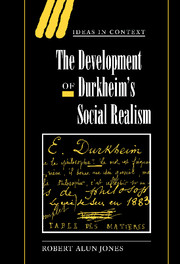Book contents
- Frontmatter
- Contents
- Acknowledgments
- Note on texts and references
- Introduction: sociology and its history
- Chapter 1 The reform that contained all other reforms
- Chapter 2 The subtlety of things
- Chapter 3 The perfection of personality
- Chapter 4 A l'école des choses
- Chapter 5 The yoke of necessity
- Conclusion: sociology and irony
- List of references
- Index
- Ideas in Context
Conclusion: sociology and irony
Published online by Cambridge University Press: 22 September 2009
- Frontmatter
- Contents
- Acknowledgments
- Note on texts and references
- Introduction: sociology and its history
- Chapter 1 The reform that contained all other reforms
- Chapter 2 The subtlety of things
- Chapter 3 The perfection of personality
- Chapter 4 A l'école des choses
- Chapter 5 The yoke of necessity
- Conclusion: sociology and irony
- List of references
- Index
- Ideas in Context
Summary
In this book, I've tried to describe the development of Durkheim's social realism less as the “discovery” of some new, hitherto unnoticed aspect of nature than as the gradual cobbling together of a vocabulary that might prove useful in speaking about it. My focus has thus been on the nature of Durkheim's interests and purposes, the writers whose language he found adaptable to them, and the works in which the re-description of these writers and the adaptation of their vocabularies was effected. As a consequence, the Durkheim who emerges from this account may seem unfamiliar and even unattractive to some sociologists. The Sens lecturer, of course, is a complete stranger; but even the Durkheim of L'Evolution pédagogique en France and L'Education morale, of the “German” essays of 1887, of the Latin thesis and the lecture-courses on Du contrat social and Emile, of Wundt rather than Comte, Comenius rather than Descartes, is someone who rarely affords us our “usual and carefully contrived pleasures of recognition.” Not unreasonably, such sociologists might ask why they should bother to become acquainted with such a figure at all. My answer – anticipated in my introduction – is that the value of such acquaintance derives precisely from this lack of familiarity, from that fact that Durkheim was indeed quite different from us.
- Type
- Chapter
- Information
- The Development of Durkheim's Social Realism , pp. 302 - 308Publisher: Cambridge University PressPrint publication year: 1999



